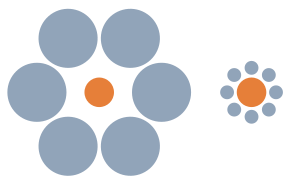What does ebbinghaus illusion mean?
Definitions for ebbinghaus illusion
ebbing·haus il·lu·sion
This dictionary definitions page includes all the possible meanings, example usage and translations of the word ebbinghaus illusion.
Did you actually mean evangelism?
Wiktionary
Ebbinghaus illusionnoun
The optical illusion whereby a disk appears smaller if surrounded by larger disks than if by smaller.
Wikipedia
Ebbinghaus illusion
The Ebbinghaus illusion or Titchener circles is an optical illusion of relative size perception. Named for its discoverer, the German psychologist Hermann Ebbinghaus (1850–1909), the illusion was popularized in the English-speaking world by Edward B. Titchener in a 1901 textbook of experimental psychology, hence its alternative name. In the best-known version of the illusion, two circles of identical size are placed near to each other, and one is surrounded by large circles while the other is surrounded by small circles. As a result of the juxtaposition of circles, the central circle surrounded by large circles appears smaller than the central circle surrounded by small circles. Recent work suggests that two other critical factors involved in the perception of the Ebbinghaus illusion are the distance of the surrounding circles from the central circle and the completeness of the annulus, which makes the illusion comparable in nature to the Delboeuf illusion. Regardless of relative size, if the surrounding circles are closer to the central circle, the central circle appears larger and if the surrounding circles are far away, the central circle appears smaller. While the distance variable appears to be an active factor in the perception of relative size, the size of the surrounding circles limits how close they can be to the central circle, resulting in many studies confounding the two variables.
Wikidata
Ebbinghaus illusion
The Ebbinghaus illusion or Titchener circles is an optical illusion of relative size perception. Named for its discoverer, the German psychologist Hermann Ebbinghaus, the illusion was popularized in the English-speaking world by Edward B. Titchener in a 1901 textbook of experimental psychology, hence its alternative name "Titchener circles". In the best-known version of the illusion, two circles of identical size are placed near to each other and one is surrounded by large circles while the other is surrounded by small circles. As a result of the juxtaposition of circles, the central circle surrounded by large circles appears smaller than the central circle surrounded by small circles. Recent work suggests that two other critical factors involved in the perception of the Ebbinghaus illusion are the distance of the surrounding circles from the central circle and the completeness of the annulus, which makes the illusion comparable in nature to the Delboeuf illusion. Regardless of relative size, if the surrounding circles are closer to the central circle, the central circle appears larger and if the surrounding circles are far away, the central circle appears smaller. While the distance variable appears to be an active factor in the perception of relative size, the size of the surrounding circles limits how close they can be to the central circle, resulting in many studies confounding the two variables.
Numerology
Chaldean Numerology
The numerical value of ebbinghaus illusion in Chaldean Numerology is: 8
Pythagorean Numerology
The numerical value of ebbinghaus illusion in Pythagorean Numerology is: 1
Translations for ebbinghaus illusion
From our Multilingual Translation Dictionary
- ebbinghaus மாயைTamil
Get even more translations for ebbinghaus illusion »
Translation
Find a translation for the ebbinghaus illusion definition in other languages:
Select another language:
- - Select -
- 简体中文 (Chinese - Simplified)
- 繁體中文 (Chinese - Traditional)
- Español (Spanish)
- Esperanto (Esperanto)
- 日本語 (Japanese)
- Português (Portuguese)
- Deutsch (German)
- العربية (Arabic)
- Français (French)
- Русский (Russian)
- ಕನ್ನಡ (Kannada)
- 한국어 (Korean)
- עברית (Hebrew)
- Gaeilge (Irish)
- Українська (Ukrainian)
- اردو (Urdu)
- Magyar (Hungarian)
- मानक हिन्दी (Hindi)
- Indonesia (Indonesian)
- Italiano (Italian)
- தமிழ் (Tamil)
- Türkçe (Turkish)
- తెలుగు (Telugu)
- ภาษาไทย (Thai)
- Tiếng Việt (Vietnamese)
- Čeština (Czech)
- Polski (Polish)
- Bahasa Indonesia (Indonesian)
- Românește (Romanian)
- Nederlands (Dutch)
- Ελληνικά (Greek)
- Latinum (Latin)
- Svenska (Swedish)
- Dansk (Danish)
- Suomi (Finnish)
- فارسی (Persian)
- ייִדיש (Yiddish)
- հայերեն (Armenian)
- Norsk (Norwegian)
- English (English)
Word of the Day
Would you like us to send you a FREE new word definition delivered to your inbox daily?
Citation
Use the citation below to add this definition to your bibliography:
Style:MLAChicagoAPA
"ebbinghaus illusion." Definitions.net. STANDS4 LLC, 2024. Web. 30 Apr. 2024. <https://www.definitions.net/definition/ebbinghaus+illusion>.



Discuss these ebbinghaus illusion definitions with the community:
Report Comment
We're doing our best to make sure our content is useful, accurate and safe.
If by any chance you spot an inappropriate comment while navigating through our website please use this form to let us know, and we'll take care of it shortly.
Attachment
You need to be logged in to favorite.
Log In